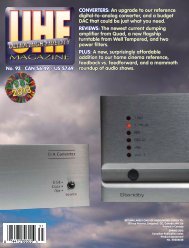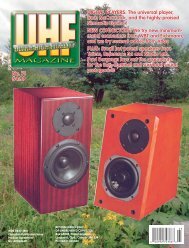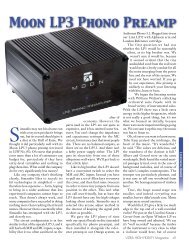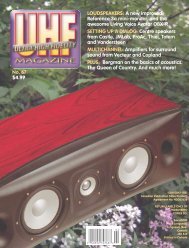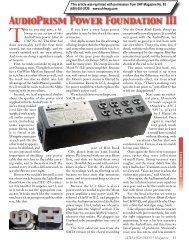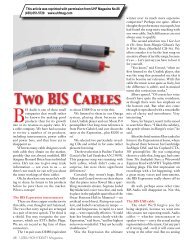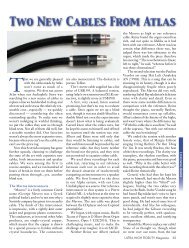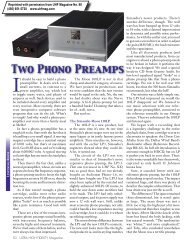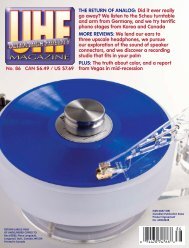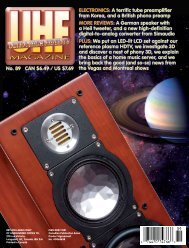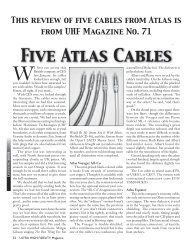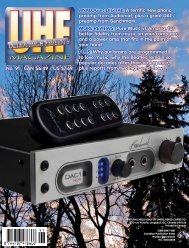USB DONE RIGHT: Two magic boxes that let computer audio ...
USB DONE RIGHT: Two magic boxes that let computer audio ...
USB DONE RIGHT: Two magic boxes that let computer audio ...
You also want an ePaper? Increase the reach of your titles
YUMPU automatically turns print PDFs into web optimized ePapers that Google loves.
Britten: Three Suites for Cello<br />
Denise Djovic<br />
Atma ACD22524<br />
Steve Bourke: What classical composer<br />
would be daring enough to try to compete<br />
head-to-head with Beethoven? No<br />
one did, really. Brahms felt compelled<br />
to be “the next Beethoven” in his early<br />
years, before finding his own unique<br />
voice.<br />
After the monumental solo cello<br />
sonatas and partitas of J. S. Bach, was any<br />
other composer brave enough to create<br />
music for the cello alone? Max Reger and<br />
Zoltán Kodály both attempted to do so<br />
in 1915, and so began a century of glory<br />
and praise for this elegant instrument.<br />
Superior cello virtuosos Pablo Casals<br />
and Mstislav Rostropovich inspired<br />
more than one modern composer to<br />
make music <strong>that</strong> was worthy of their<br />
skill, and so it was with Benjamin Britten.<br />
After seeing Rostropovich play<br />
Shostakovitch’s first cello concerto in<br />
1960, he declared it “the most extraordinary<br />
cello performance I have ever<br />
heard.” He immediately began to compose<br />
for Rostropovich, the wonderful<br />
result being the extraordinary music<br />
found in these suites, comp<strong>let</strong>ed in 1971.<br />
Each is brimming with variety —<br />
upper octave wisps of pleasure followed<br />
by deep musky tones, then a tiny, almost<br />
inaudible, fragile sound creates suspense.<br />
Then a rush of modern harmonies<br />
abruptly shifts the mood. It builds and<br />
expands until your emotions again start<br />
70 ULTRA HIGH FIDELITY Magazine<br />
Software Reviews<br />
by Steve Bourke<br />
and Gerard Rejskind<br />
to anticipate a shift to the next magnetic<br />
feeling. It becomes a pleasant guessing<br />
game to predict which moods, and what<br />
tempos, are about to arrive.<br />
Rhythmic switches are constant,<br />
so much so <strong>that</strong> I began to experience<br />
the music as a rewarding kind of classical<br />
jazz. Only <strong>that</strong> jazz element called<br />
improvisation is not present.<br />
Perhaps you admire great musicianship<br />
as well as great music. If <strong>that</strong> is the<br />
case, cellist Denise Djokic is just the one<br />
to reward you with the professionalism<br />
you require. Benjamin Britten himself<br />
surely had a virtuoso like her in mind<br />
when he declared <strong>that</strong> he “always liked<br />
to write music not just for performers,<br />
but for people who are close to me<br />
spiritually.”<br />
Denise has been named by Maclean’s<br />
magazine as one of 25 Canadians who<br />
are changing our world. Elle Magazine<br />
describes her as one of “Canada’s most<br />
powerful women.” In her hands the<br />
instrument flourishes. All its textures,<br />
tones and delicacies are hers for the<br />
playing, and ours to enjoy.<br />
And the cello, once scorned by lovers<br />
of the viola de gamba during the mid-18 th<br />
Century, is today an icon of the classical<br />
music world, adored for its tonal beauty<br />
and stylistic versatility.<br />
Harpsichord Music From a Thin<br />
Place<br />
Paul Cienniwa<br />
Balaena WCS 059<br />
Gerard Rejskind: There’s no mystery<br />
why the harpsichord fell out of favor in<br />
the late 18 th Century and was replaced<br />
by the piano. The harpsichord produces<br />
sound by strumming its strings, rather<br />
like a guitar, and it lacked the loudness to<br />
compete with the ever larger orchestras<br />
in the new and bigger concert halls. It<br />
had another disadvantage too. Unlike<br />
the organ, whose repertoire it was<br />
expected to play, the harpsichord plays<br />
each note at the same volume, narrowing<br />
its range of emotional expression.<br />
Though Bach played and wrote for the<br />
harpsichord (or “the keyboard,” which<br />
could mean organ or harpsichord), the<br />
great pianist Glenn Gould argued <strong>that</strong><br />
he would have preferred the piano had<br />
he had access to it.<br />
And yet there is something special<br />
about the sound of the harpsichord, even<br />
to our ears so jaded by the infinite variety<br />
of electronic instruments. Unlike the<br />
piano, the harpsichord produces notes<br />
with a discreet fundamental tone, which<br />
is however rich in harmonics. It cannot<br />
be confused with any other instrument.<br />
That very richness, however, make it<br />
challenging to record, and to reproduce.<br />
Pretty much any reproduction system<br />
has difficulty with higher frequencies,<br />
and <strong>that</strong> goes double for digital. Few<br />
instruments other than the modern<br />
flute have such harmonics, and they’re<br />
a challenge. The result is <strong>that</strong> many<br />
harpsichord recordings are difficult to<br />
listen to for long, because they trigger<br />
major listener fatigue.<br />
This recording is a major exception.<br />
To capture at once the delicacy and<br />
the richness of the instrument, engineer<br />
Walter Klimasewski used a single pair<br />
of Schoeps CMC 64 microphones, with<br />
neither equalization nor compression.<br />
Avoiding compression and volume<br />
limiting usually means leaving plenty<br />
of headroom, but in fact there is a lot of<br />
volume on this CD. All the bits are used,<br />
yet there is no trace of overload.<br />
Why the odd title? Paul Cienniwa<br />
says <strong>that</strong> the “thin place” is the threshold



